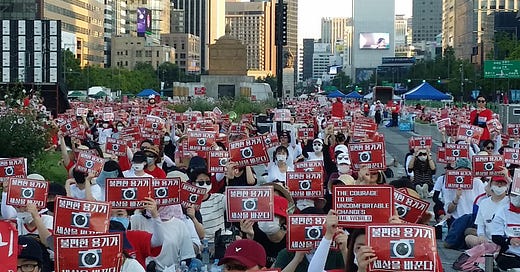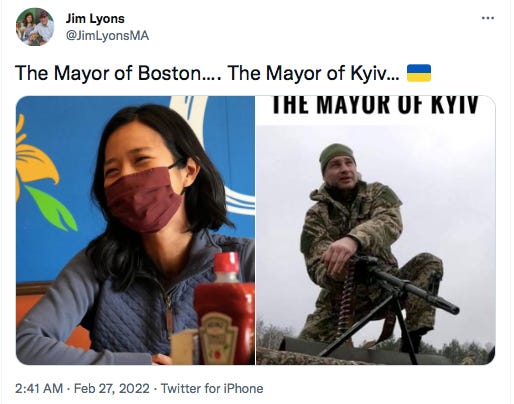In South Korea polls, top presidential candidates are rallying for the anti-feminism vote, and other stories
#WomenLead (Issue 87): Your weekly round-up on women in politics
Hello, and welcome to Issue 87.
What a terrifying and grim week this has been. All our thoughts are with the people of Ukraine as they defend themselves against the brute violence unleashed on them by Russia. And we really hope that the international community can step up and help bring this war to an end at the earliest.
In this week’s edition we bring you updates from Israel, UK and USA. And the spotlight is on South Korea where soon-to-be-held Presidential polls have unleashed a rather ugly politics against women’s rights. In case you missed last week’s edition, you can read it here.
Quick Updates
🛑 DANGEROUS LIES: In the UK, opposition MP Zarah Sultana is facing the impact of Russia’s attack on Ukraine in a different and disturbing way. She has received death threats filled with racist abuse calling her Russian President Vladimir Putin’s “whore”. Sultana was one of eleven MPs who had been critical of NATO’s expansion. BBC carried a report which misrepresented her stance alleging that she had suggested that NATO was responsible for the crisis in Ukraine (BBC apologized later). Some other leaders and some anonymous sources (inaccurately) furthered this narrative, calling her an “agitator for Putin’s Russia” and a “mouthpiece for the Kremlin”.
In a statement posted on Twitter, Sultana wrote about the death threats in the context of the assassination of two UK MPs in recent years, and said she was “acutely aware” of risks to her safety as a young Muslim woman.
🤢 MINDLESS INSULTS: In the USA, Jim Lyons of the Republican Party tweeted two pictures comparing the mayor of Ukrainian capital Kyiv with Michelle Wu, the current mayor of Boston. (Yes, we know what you are thinking, “But why?!”).
Lyons apparently thought that it would be a good time to insult Wu. Wu’s picture is of her wearing a mask and at a food table, while Kyiv mayor Vitali Klitschko is shown in military attire holding a weapon. We still don’t know what he was thinking but Wu was spot on in reminding him in a reference to Donald Trump, “Jim, your pal was impeached for withholding military aid to Ukraine. We’re with you, Mayor Klitschko!”
⚡ PATHBREAKER: Ghaida Rinawie Zoabi has been appointed Israel’s consul general in Shanghai, making her the first Arab woman to head an Israeli diplomatic mission. Zoabi’s appointment is especially striking because she has been fairly open about her critical stances on Israel’s politics. She does not recognize Israel as a Jewish state, and opposes the national anthem because she says the words “Jewish souls” exclude her. Her appointment has been criticized by those on the political right, including those within the ruling coalition. While announcing Zoabi’s appointment, Foreign Affairs Minister Yair Lapid said she had a rich background in administration, and a diverse and impressive economic experience and public service.
Spotlight: SOUTH KOREA 🇰🇷🇰🇷🇰🇷
“Abolition of the Ministry of Gender Equality and Family”.
That is among the major poll promises of Yoon Suk Yeol of People Power Party, one of the two front-runners to be South Korea’s next President. The country goes to polls on March 9 after a campaign that has put misogyny among the country’s men and their anti-feminism movement in the spotlight.
This is a radical shift from just five years ago, when current President Moon Jae-in had contested the polls with the promise to “become a feminist president”. Moon not only won that poll but remains a popular leader. (South Korea’s laws however do not allow more than one term per President).
And yet, the mood in this election is different. Feminism and women’s rights have become a political taboo, and both contestants (Lee Jae-myung of the Democratic Party being Yoon’s rival), aged over 55 themselves, are trying to win over the male vote - especially the young men in their 20s and 30s.

South Korea has seen a growth in anti-feminism attitudes in recent years. “Divisive gender politics has grown as South Korea deals with a fast-aging population, a plummeting birth rate, soaring personal debt, a decaying job market and stark inequality,” notes a report by the Associated Press.
A suicide-prevention website set up for young women during Covid-19 went offline temporarily after cyberattacks by online mobs who were angry that the website disregarded men’s lives. An San, who became the first archer in Olympic history to win three gold medals at the single games, has received massive hate online for her short hair, and because she enrolled at the Kwangju Women’s University.
"Feminism should be healthy feminism, and not be exploited for elections and staying in power,” Yoon had said in August 2021, according to a report in Nikkei Asia. He also implied that feminism was a factor in the country’s low birth rates, and said that feminism was "so politically abused that it acts as an emotional barrier to healthy relationships between men and women." Yoon has also promised stronger penalties for false sexual assault complaints, a promise that should be read in the context of growing male backlash against a strong #MeToo movement in the country.

In January, Yoon announced in a Facebook post his promise to abolish the Ministry of Gender Equality and Family if he wins. He claimed that it promoted policies that are unfair to men.
Interestingly, the Ministry’s budget comprises just 0.2 percent of the total national budget, and less than 3 percent of its budget targets women’s economic equality promotion, observes an analysis in the Council on Foreign Relations. But clearly, facts matter little over the symbolism of the promise. The promise was immediately effective. Yoon’s polling figures jumped by over 6 percent, taking him slightly ahead of his main competitor Lee.
“Yoon is tapping into the resentment of men in their 20s and 30s who face a bleak job market while agonizing over soaring housing prices and dimming prospects for marriage and parenthood.
They are increasingly sensitive to competition from women, who often outpace them at school and are more eager to break from traditional gender roles for professional advancement.
Even as many men cling to the notion that their female colleagues have it easier in the workplace - including being exempt from a mandatory 18-month military service - women have begun to more loudly criticize a male-centered corporate culture that exposes them to harassment, unequal pay and promotions, and often derails their careers after they have children.”
If Yoon is taking a clear position against women’s rights, his opponent Lee and the Democratic Party don’t offer much hope either. In the run-up to the polls, the party saw a number of complaints of sexual harassment. The party’s response - and refusal to investigate some of these cases - has left many supporters disappointed. Lee has also been criticised for defending his nephew accused of brutally killing two women. And given the importance of the young male vote, Lee has also taken a cautious approach to issues around gender. He has said he would not abolish the Gender Ministry but may change its name.
Both campaigns have left many women feeling alienated. “This presidential race is an election where women have been erased,” Jang Hye-Yeong of the minority left-wing Justice Party observed. “Women are being treated like they don’t even have voting rights,” a 27-year-old woman told the Associated Press.
Regardless of who wins this week’s polls, this rhetoric holds a very dangerous potential for what lies ahead for South Korea’s women who are already battling patriarchy in multiple ways. We send our solidarity and strength their way.
Video of the week

Watch Rappler’s dispatch on a campaign rally of Leni Robredo, the only woman running to be the next President of the Philippines
Reflections & Reads
“Rebels, victims, peacebuilders”: On how years of fighting between separatists and the state in Cameroon have hit women in the country particularly hard. (via Crisis Group)
“Dynasties’ daughters and martyrs’ widows”: On how the political inheritance of so many women leaders in Asia has been aided, not harmed, by patriarchal gender stereotypes. (via The Diplomat)
“‘It can be done’: how a strong female crossbench could challenge Australian politics” (via The Guardian)
That’s a wrap for this week! If you liked reading this edition, press the ❤️ button, and forward this to a friend/colleague or share it on your social media! Thank you! We’ll see you next weekend with Issue 88!
But before we go, a request - if you like what we do, please consider purchasing a paid subscription to this newsletter. We depend entirely on reader support to grow and your payments help us stay sustainable. Thank you!




